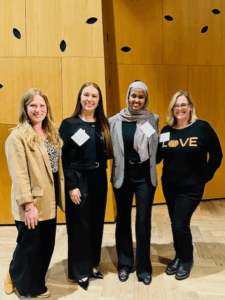Mitchell Hamline women were highlighted at the 31st annual Rosalie Wahl Leadership Lecture hosted by Minnesota Women Lawyers (MWL) on Oct. 30. A keynote panel featuring several alumni focused on mental health and wellness for lawyers, a critical topic for legal education and the profession alike, and three Mitchell Hamline students were honored with MWL awards and scholarships.

Keynote panelists (from left): Kendra Brodin, Professor Natalie Netzel ’15; Lica Tomizuka, and Judge Sophia Vuelo ’98
One keynote panelist, Professor Natalie Netzel ’15, focuses her scholarly interests on trauma-informed lawyering, trauma-informed pedagogy, and law student and attorney mental health and well-being. She serves as director of the clinical program and currently holds the John H. Faricy Jr. Professorship for Empirical Research in the Law.
“Right now, lawyers and judges are carrying an immense weight—not only as professionals, but as public citizens with a special responsibility for the quality of justice,” said Netzel. “The emotional and moral toll of that work can be profound. That’s why community and collective care are essential. We can’t do this work well in isolation and we can’t keep pretending like mental health issues in law are individual experiences with only individual fixes.”
Alongside Netzel, the panel featured Judge Sophia Vuelo ’98, who serves in Minnesota’s Second Judicial District; Kendra Brodin, CEO and founder of EsquireWell; and Lica Tomizuka, partner at Faegre Drinker Biddle & Reath. Together, they explored the cost of care and shared strategies to foster resilience in the face of burnout.
Barbara Klas ’91, director of alumni relations and annual giving at Mitchell Hamline, became a member of MWL while she was still a law student and called the event “truly inspirational.”
“The energy in the room filled with Minnesota women lawyers, law students, and community leaders was palpable—women supporting women, empowering each other, unstoppable, undeterred,” said Klas.

Professor Natalie Netzel ’15 with scholarship recipients Rachel Evangelisto and Ikran Noor and Mitchell Hamline Dean of Students Lynn LeMoine ’11
During the evening, MWL also awarded their annual Social Justice Writing Award and law student scholarships through the MWL Foundation. Three of the four recipients were current Mitchell Hamline students.
“My cup overflowed as I witnessed our Mitchell Hamline law students steal the show and receive MWL’s student awards,” said Klas. “They are our future, and because of these inspiring women, I remain hopeful.”
Heather Kainz is a 3L student who clerked for the Minnesota Disability Law Center and was appointed to the Minnesota Governor’s Council on Developmental Disabilities. She received the Social Justice Writing Award, which celebrates the vision and scholarship of law students who tackle timely and essential issues of equity and social justice, for her paper entitled “We the People: Ending Subminimum Wage Through Alternative Means Where Legislation Has Failed.”
Rachel Evangelisto, current 3L student and enrolled member of the Standing Rock Lakota Sioux, received the Leslie Altman Memorial Law Student Scholarship. Evangelisto serves as the current president of Mitchell Hamline’s Native American Law Students Association (NALSA) and secretary for the National NALSA.
Ikran Noor, current 2L student, received the Hollins-Matchett-Mitchell Law Student Scholarship. She is involved in leadership in the Black Law Student Association (BLSA) and the Legal Association of Women Students (LAWS) at Mitchell Hamline.
The Rosalie Wahl Leadership Lecture series was established in 1994 by MWL to honor the career of Justice Rosalie Wahl ’67, the first woman justice to serve on the Minnesota Supreme Court. Justice Wahl was also instrumental in co-founding Mitchell Hamline’s clinical program in 1973, and the school’s Legal Practice Center bears her name today.
“We need spaces like the Rosalie Wahl Leadership Lecture to come together, name the challenges, and support one another in tending to our well-being,” added Netzel. “Attorney and judicial well-being is a justice issue—we need to be well to do good in our roles.”
